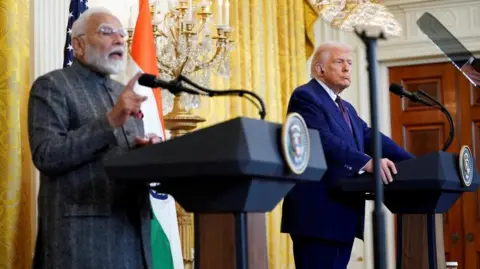In recent developments, former U.S. President Donald Trump has issued a significant warning to India regarding its continued purchase of oil from Russia. Trump announced via his Truth Social platform that he intends to impose “substantially” elevated tariffs on India due to its ongoing transactions involving Russian oil. This assertion has ignited considerable discourse surrounding international trade relations and geopolitical alliances.
Trump expressed his concerns starkly, accusing India of indifference towards the humanitarian crisis unfolding in Ukraine as a result of the Russian invasion, which commenced in 2022. India’s role has become increasingly pivotal as it stands among the largest importers of Russian oil ever since many European nations curtailed their trade with Moscow. The timing of Trump’s threat coincides closely with his previous declaration of a notable 25% tariff on imports from India just days earlier, signaling a more aggressive approach toward trade policy underlining the U.S. administration’s stance on Russian aggression.
In response to Trump’s statements, India’s officials labeled the assertions as “unjustified and unreasonable.” At the heart of the criticism from Delhi is a spokesperson from India’s foreign ministry, Randhir Jaiswal, who highlighted that the U.S. had previously urged India to engage in the importation of Russian gas to bolster global energy market stability. Jaiswal also clarified that India’s pivot toward Russian oil was a strategic decision following the redirection of traditional supplies to Europe amidst the escalating conflict.
Adding another layer of complexity to the situation, India has indicated its discontent with the U.S. for introducing these tariffs, especially considering that the U.S. continues to engage in trade with Russia despite the sanctions. In 2022, the U.S. conducted approximately $3.5 billion in trade with Russia, suggesting a critical inconsistency in the expectations placed on India by the U.S. government.
As India navigates its energy requirements, officials assert that it will prioritize its national interests and economic security in its dealings. Following Trump’s remarks, he did reinforce a notion of friendship towards India while simultaneously criticizing its tariffs on U.S. goods, cautioning against unspecified “penalties” related to its trade ties with Moscow.
Moreover, Trump’s discourse on social media criticized India’s actions as contradictory, emphasizing that the nation engages in significant purchases of Russian oil which it subsequently re-sells on the global market for profit. Observers and trade analysts, however, argue that Trump’s criticisms are based on misconceptions regarding India’s oil market dynamics. Ajay Srivastava, a former trade official, highlighted that India’s actions are primarily aimed at stabilizing global oil markets, particularly in light of interruptions caused by sanctions on Russia.
The independence of Indian oil refineries is also noteworthy; they operate autonomously, making decisions based on factors like pricing, supply security, and international regulations without direct government oversight. Trump’s escalating rhetoric against Russia, particularly in light of his demand for a peace agreement with Ukraine by early August, suggests that these geopolitical tensions are far from resolved, with the U.S. reiterating its position against Russian military operations in Ukraine.
As events unfold, Trump’s international stance appears to evolve. While Trump’s administration previously focused on improving relations with Russia, his recent remarks signal a potential hardline approach against not just Russia but also against nations he perceives as facilitating its economy, drawing complex lines within the global political landscape. The upcoming visit of U.S. envoy Steve Witkoff to Russia adds another dimension to this intricate narrative, as diplomatic negotiations continue amid the backdrop of these rising tensions.
In this web of trade, diplomacy, and international relations, it remains to be seen how India will navigate its path amid external pressures while ensuring its domestic needs and economic goals are met.












